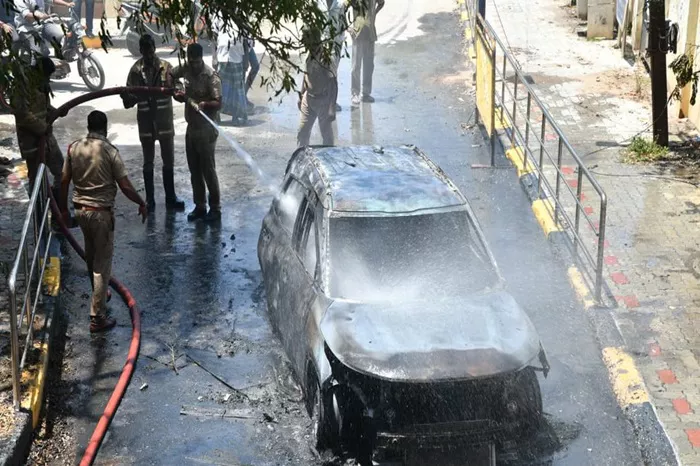The question of whether a diesel car can catch fire is significant for both vehicle owners and manufacturers. Diesel engines, known for their efficiency and power, are widely used in various vehicles, from passenger cars to heavy-duty trucks. However, like any internal combustion engine, they are not immune to the risk of fire. Understanding the causes, risks, and preventive measures associated with diesel car fires is essential for ensuring safety on the roads.
Overview of Diesel Engines
Diesel engines operate on a different principle than gasoline engines. They use compression ignition rather than spark ignition, which makes them more efficient and powerful for heavy-duty applications. Diesel fuel has a higher energy density than gasoline, providing better fuel economy. However, this also means that when diesel fuel ignites, it can burn hotter and longer than gasoline, potentially leading to more severe fire incidents if not managed properly.
The Importance of Fire Safety in Diesel Vehicles
Vehicle fires can occur due to various factors, including mechanical failures, electrical issues, and fuel system leaks. According to studies, the risk of fire in diesel vehicles is higher compared to electric vehicles but lower than in gasoline-powered cars. Understanding these risks can help drivers take necessary precautions to minimize the likelihood of fire incidents.
Causes of Diesel Car Fires
1. Fuel System Failures
Fuel Leaks
One of the primary causes of fires in diesel vehicles is fuel leaks. These leaks can occur due to worn or damaged fuel lines, faulty injectors, or other components within the fuel system. When diesel fuel leaks onto hot engine parts or electrical components, it poses a significant fire risk1.
Overheating Engines
Diesel engines can overheat due to various reasons such as low coolant levels, blocked radiators, or malfunctioning thermostats. An overheating engine can lead to vaporization of diesel fuel and subsequent ignition if it comes into contact with hot surfaces1.
2. Electrical Issues
Short Circuits
Electrical faults are another common cause of fires in diesel vehicles. Short circuits can occur due to damaged wiring or faulty electrical components. When electricity arcs across damaged wires or connections, it can ignite nearby combustible materials1.
Battery Failures
While less common in diesel vehicles compared to electric cars, battery failures can also lead to fires. Overcharging or manufacturing defects in batteries can cause them to overheat and ignite1.
3. Exhaust System Problems
Blockages and Damage
The exhaust system is critical for directing hot gases away from the engine. Blockages or damage in the exhaust system can cause excessive heat buildup. If this heat reaches flammable materials near the exhaust system, a fire could ignite1.
Risk Comparison: Diesel vs. Other Vehicles
Diesel Cars vs. Gasoline Cars
Research indicates that diesel-powered cars have a lower risk of catching fire compared to gasoline vehicles. The Swedish Civil Contingencies Agency reported that petrol and diesel cars are nineteen times more likely to catch fire than electric vehicles5. This statistic highlights the importance of understanding the specific risks associated with different types of vehicles.
Diesel Cars vs. Electric Vehicles
Electric vehicles (EVs) are often perceived as having a higher risk of fire due to their battery systems. However, studies show that EVs have a significantly lower incidence of fires compared to internal combustion engine (ICE) vehicles, including diesels. The chance of an EV catching fire is approximately 0.0012%, while ICE vehicles have a risk of about 0.1%35. This stark contrast emphasizes that while diesel cars do have fire risks, they are not as pronounced as those found in gasoline-powered vehicles.
Preventive Measures for Diesel Vehicle Owners
1. Regular Maintenance
Routine Inspections
Regular maintenance checks are crucial for identifying potential issues before they escalate into serious problems. Inspecting fuel lines for leaks, checking electrical systems for faults, and monitoring engine temperatures can significantly reduce the risk of fire15.
Cooling System Maintenance
Ensuring that the cooling system is functioning correctly is vital for preventing overheating in diesel engines. Regularly checking coolant levels and inspecting radiators for blockages will help maintain optimal operating temperatures1.
2. Fuel System Checks
Leak Detection
Drivers should be vigilant about detecting fuel leaks early on. This includes checking for any signs of diesel pooling under the vehicle or noticing a strong smell of diesel fuel while driving1.
Using Quality Fuel
Using high-quality diesel fuel that meets industry standards can also help reduce the risk of combustion-related issues within the engine2.
3. Electrical System Management
Wiring Inspections
Regularly inspecting electrical wiring for wear and tear is essential in preventing short circuits that could lead to fires1.
Battery Care
For vehicles equipped with batteries (especially those with start-assist systems), ensuring proper maintenance and using manufacturer-recommended charging equipment is critical12.
Conclusion
In conclusion, while diesel cars do have inherent risks associated with fire incidents, these risks can be managed effectively through regular maintenance and awareness of potential hazards. Understanding the specific causes of fires in diesel vehicles allows owners to take proactive measures to mitigate these risks. By prioritizing safety and adhering to maintenance schedules, drivers can enjoy the benefits of diesel engines while minimizing the chances of fire-related incidents on the road.
Related topic:

